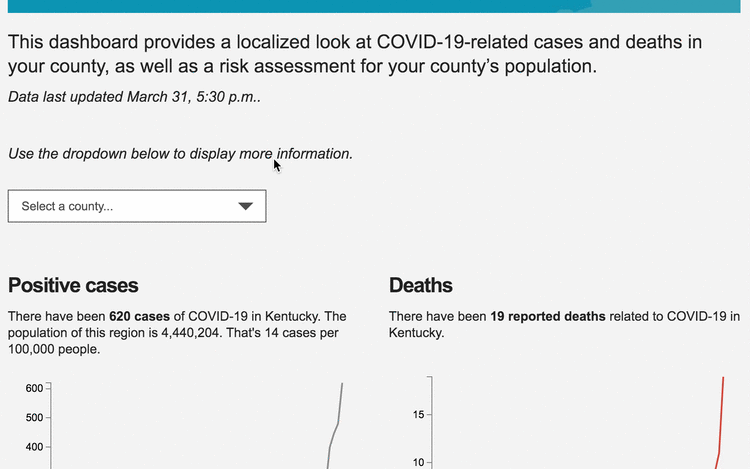This article was originally published by Ohio Valley ReSource.
The coronavirus pandemic has already infected thousands in the Ohio Valley and upended life and work for nearly all of us. In such a fast-moving pandemic, it can be hard to keep all the information straight. The Ohio Valley ReSource and its partner stations asked you what you wanted to know, and took your questions to someone with answers.
Dr. Gerald Keusch is a professor of medicine and international health at Boston University, and the director of the Collaborative Research Core at BU’s National Emerging Infectious Disease Laboratory. Ohio Valley ReSource posed your questions to him Wednesday. His responses have been lightly edited for length and clarity.
OVR: A listener at WKYU wants to know, when someone recovers fully from the coronavirus, are they then immune from catching this strain of the coronavirus again?
GK: Well, the honest answer is, we don’t know, and maybe. We don’t have the data. There are a couple of anecdotes in China that say people who have been ill, recovered, can get infected again, but that doesn’t mean that they’ve been reinfected; that may mean they have a relapse.
OVR: If I can just follow up on that, once we’re on the downward slope of this thing, what’s the best way for us to behave if we can’t be sure whether we could contract it again?
GK: Well, the best thing for prevention is something called vaccination, immunization. And there’s one where the behavior of your listeners could be rather important. I would ask, how many of your concerned listeners get immunized with influenza vaccine? That’s a prevention method. Now, if the current efforts on vaccine development move rapidly and we can demonstrate it’s safe and effective, we may have a vaccine sometime in 2021. I would recommend, if there is one, people get immunized.
OVR: Another listener at ReSource partner station WKYU in Bowling Green, Kentucky, asks, “Has there been any correlation between death rate and blood type?”
GK: The answer again is no, there’s just beginning to be some attempts to analyze information on people who have proven COVID-19 infection where people have survived or not, and where blood typing has been done. It’s interesting scientifically, but I don’t know what relevance it has for anybody to worry about their blood group in relation to susceptibility to this infection. The public health measures we can take to mitigate — and you know it, the social distancing, the handwashing — all of those have a clear impact on the transmission of infection in the population. Blood group won’t make a heck of a difference.

OVR: A West Virginia Public Broadcasting listener asked, “Does the virus increase the need for sleep? I am a healthy 78-year-old, usually up late (1:30 – 2:00), but lately, I am waking later and later.”
GK: Well, I don’t know in the particular instance of your listener. I would say that the isolation of self-quarantine and the anxiety may be part of the reason this individual is feeling like they need more sleep.
But to take it at a different level, over the eons of evolution, we have accumulated responses that help to protect us from infection. Fever is an evolved response. It’s across multiple species, it’s even in cold-blooded animals that can’t regulate their temperature like we do. It’s an evolved response because higher temperature increases the activity of metabolism of cells, increase the function of the immune system, and in some instances, can actually kill the pathogen.
These same molecules that rev up the immune system also make us sleepy. So there’s this coordinated interaction between activating our immune system, a symptom like fever, and changes in behavior, that work together to protect the host from infection.
I would suspect in your listener’s case, that it’s more likely anxiety, but sleepiness is part of infection. He or she may have had a mild respiratory infection, which may or may not have been COVID-19. Hopefully, they are well recovered.
OVR: Another listener in West Virginia asks, “If I wear a mask and/or gloves and get exposed to the virus, if I let them sit for more than 72 hours, can I reuse them?”
GK: It’s a good question, particularly in the sense of there being such shortages. And so I’m going to assume that this is not a high-grade, health care-worker type of mask, which are known as N95s, which the public should not be hoarding. The public is at much lower risk than health care workers, and you don’t want health care workers getting sick and not being able to take care of patients coming into the hospital.
But let’s assume this is a regular, common mask. Whether that mask has been contaminated, you won’t know. And whether or not the virus can survive [on the mask], we don’t have good enough data there. I don’t exactly know how to answer that question for your listener. I haven’t seen that information. But what I am saying is, be prudent, don’t panic. And being prudent has to do with, don’t go out if you don’t have to. Keep that 6-feet barrier to protect you from these aerosols. And handwashing.
Dr. Gerald Keusch is the director of the Collaborative Research Core at Boston University’s National Emerging Infectious Disease Laboratory. He answered your questions about the coronavirus pandemic.



